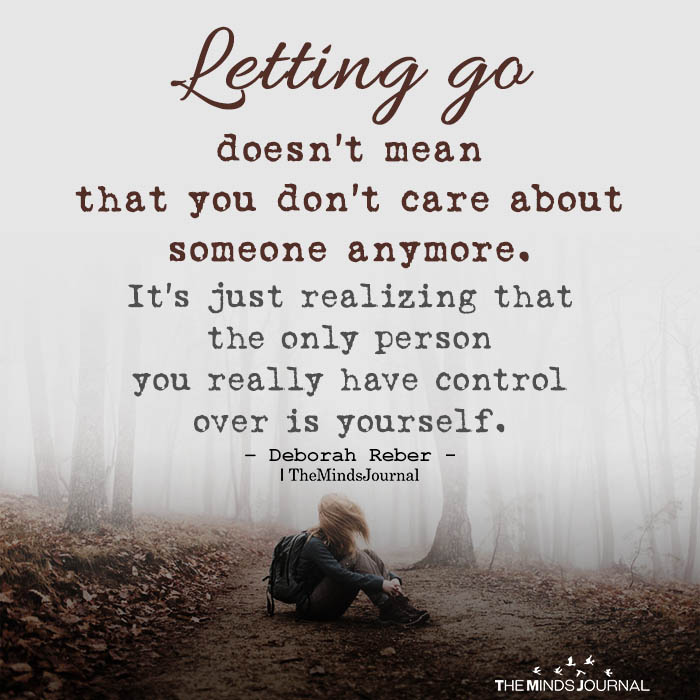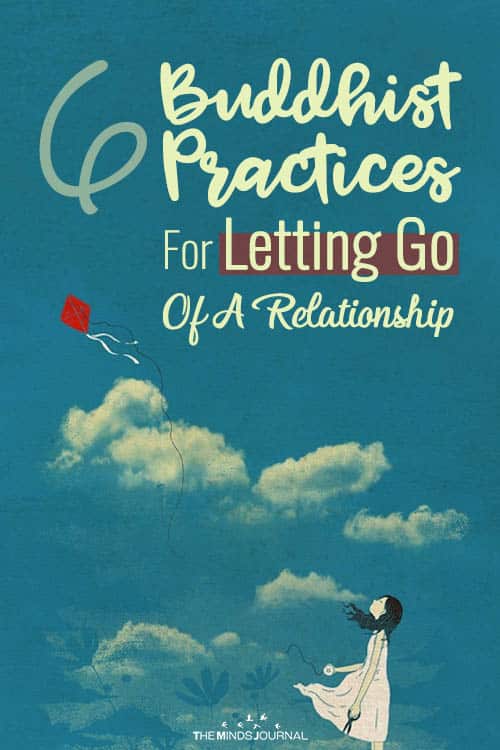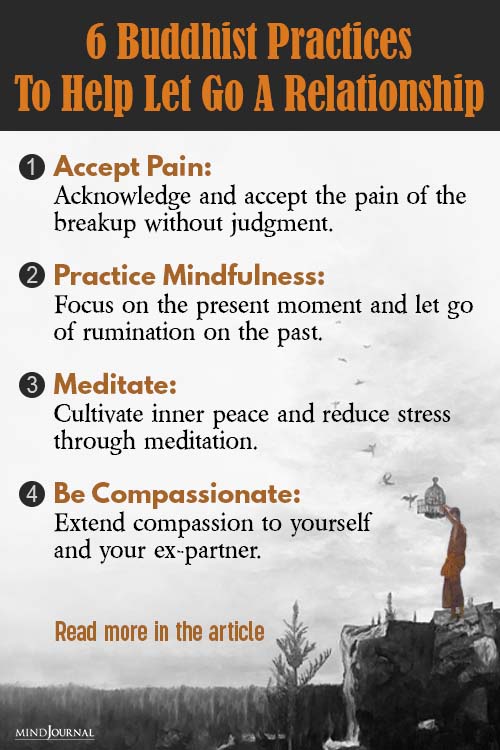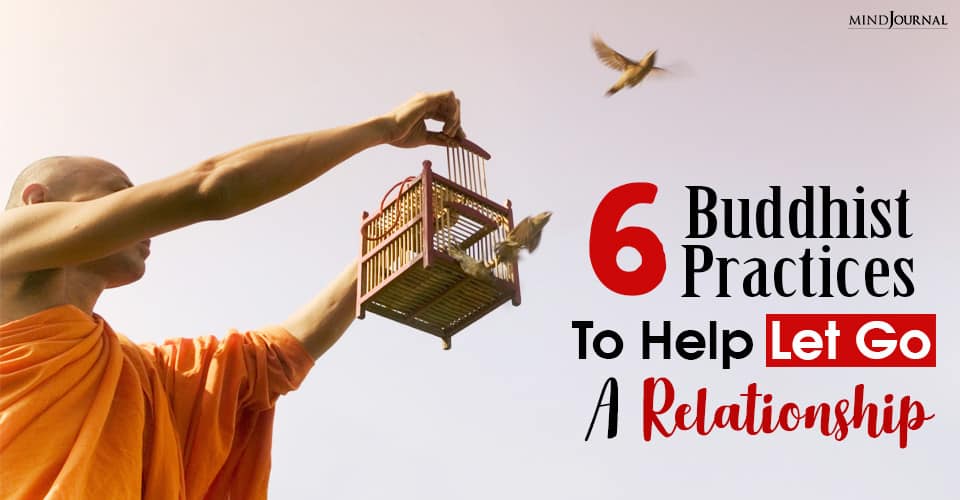How easy is it to get over a relationship? How easy is it to let go of someone you love deeply? My answer is: It’s not easy at all. In fact, it is one of the last things I wanted to do. But life has its own plans. And so does love.
The more you try to hold on to a relationship…the more you try to hold on to someone, the harder it gets. The cracks become bigger. The intimacy gets weaker. The emotional bond starts to shatter. And it becomes more painful than it was. Sometimes, letting go of a relationship can be the best thing you can do, especially if you truly love them.
Read: 8 Buddhist Beliefs To Heal Your Soul and Find Happiness
Relationships can be complicated
And breakups can be exceptionally painful. When we are in a relationship we become strongly attached to our partner both mentally and emotionally. However, we often confuse attachment with love. We believe that the stronger the attachment, the more intense our love will become. But it only leads to further complications in the relationship. This leads to unrealistic expectations, miscommunication, misunderstandings which weakens the relationship.
As your relationship starts to falter, you become more attached to your partner and cling to them even more. As you become insecure about the relationship and yourself, you start to suffer. However, letting go of a relationship and your desires & attachments can enable you to find happiness and inner peace.

Letting go is NOT easy
“Letting go gives us freedom, and freedom is the only condition for happiness. If, in our heart, we still cling to anything – anger, anxiety, or possessions – we cannot be free.” – Thich Nhat Hanh
If only I could tell you that detaching from the person you love and letting them go was a simple process. But I can’t. Cause it’s not. Breakups are hard on most of us, whether you want it or not.
When my ex of 5 years told me she wanted to end things, I did exactly what I shouldn’t have done. I tried to convince her, manipulate her, impress her and even beg her to stay with me. Although she stayed for a while, it only made things worse. And it made me more desperate. More attached. More insecure.
The more I tried to hold on to her, the farther she went away from me.
I thought this is what love is supposed to be like.
“But when one masters this wretched desire, which is so hard to overcome, then one’s sorrows just drop off, like a drop of water off a lotus.” – Gautama Buddha
You don’t give up on the ones you love, right? Wrong. I was only being selfish. Love is not about manipulating or forcing someone to stay with you when they are no longer in love with you. That’s the thing with love. It can change. It can end. It can restart and grow. Love doesn’t have to last forever. And that’s okay.
And it took me a lot of time to realize that. But even then, I didn’t know what to do about it. That’s when I stumbled on to a Buddhist monk as if I was destined to meet him. That’s when I realized love is not attachment. The things he taught me completely changed my perception of love, relationships, and desire. Love is about letting them go when they want to leave and still praying for their happiness. It is not about grasping onto false hope. It’s not about unhealthy attachments.
If you wish to cling to a weak relationship and be an insecure, unhappy person bathed in persistent suffering, then the path of desire & attachment can certainly be your best option. However, if you want to experience happiness, inner peace, and true love, then Buddhism can help you stop clinging and get detached from the suffering.
Read: 6 Ways to Practice Non-Attachment and Find Inner Peace
Desire is the root of suffering
According to Buddhism, desire causes suffering. In fact, this is one of the Four Noble Truths which is the core of Gautama Buddha’s teachings.
These 4 noble truths are-
1. The Truth of Suffering: Dukkha or suffering is a natural part of life and existence.
2. The Truth of the Cause of Suffering: Samudaya or the cause of this suffering is desire or attachment.
3. The Truth of the End of Suffering: Nirodha or cessation of this suffering is possible by eliminating desire and attachment.
4. The Truth of the Path to the End of Suffering: Magga or the Noble Eightfold Path is the way to end this suffering.

Buddhists often compare Gautama Buddha to a physician which is evident here. In the first truth, he diagnosed the problem. In the second, he identified the cause, in the third truth, he realized there is acure, and in the final one, he offers a prescription.
Non attachment: The secret to a happy relationship
“According to Buddhist psychology, most of our troubles stem from attachment to things that we mistakenly see as permanent.” – Dalai Lama
Buddhism has very broad views regarding romantic relationships. According to Buddhist beliefs, an ideal relationship should encourage non-attachment and independence. As attachment causes suffering, non-attachment can help you build a meaningful relationship and a happy life.
Buddhism teachings focus on the idea of letting go of desires and attachments, in a spiritual sense, which may cause pain and suffering. However, to detach yourself you need to eliminate the idea of a ‘perfect partner’ and stop putting your partner on a pedestal. You also need to stop having unrealistic expectations from them. You need to unconditionally accept your partner as they are and support them in their journey of finding their true self, without imposing your beliefs of who they should be.
Accepting your partner for who they are, despite how much they may change in life, is the secret to a happy and fulfilling romantic relationship. Buddhism compels us to take a deeper look at ourselves and understand what unconditional love means. However, you need to realize that non-attachment does not refer to indifference in a relationship. Non-attachment is simply the absence of insecurity, clinginess,and fear of losing your partner.
Read: Why One Person Cannot Meet All Your Emotional Needs
Buddhist Practices To Help Let Go
Realizing that you are clingy and too attached to your relationship and actually becoming detached are very different things. Despite how easy it may sound, letting go is not easy. However, there are certain practices and habits that you can develop to start the process of letting go of a relationship according to Buddhist beliefs.
Here I have listed some beliefs, practices and habits that you need to build to let go of someone you love.
1. Accept pain.
“Pain in life is inevitable but suffering is not. Pain is what the world does to you, suffering is what you do to yourself.” – Gautama Buddha
As mentioned in the Four Noble Truths, the reality is ‘pain is inevitable’. You cannot avoid it. Regardless of how well you plan for your life, it will always have surprises that will either lift you up or bring you to your knees. You will lose things and people that matter to you the most and you will feel pain. But whether you suffer through the experience or not is up to you.
Whether you learn from these experiences and evolve or hold on to what you have lost is what will decide the course of your life. As the old Buddhist proverb goes, “Pain is inevitable. Suffering is optional”.

2. Practice mindfulness.
“Mindfulness is simply being aware of what is happening right now without wishing it were different; enjoying the pleasant without holding on when it changes (which it will); being with the unpleasant without fearing it will always be this way (which it won’t).” – James Baraz
Mindfulness has been one of the most life-changing practices for me. It has helped me to focus on and live in the present moment, appreciate it for what it is. When you live in the moment, you detach yourself from the past. You detach yourself from what has been and enjoy what is. You don’t dwell on past events or worry about the future. Mindfulness empowers you to accept reality without getting too attached to it.
Mindfulness is a complete mind and body awareness practice where you bring your focus to the present moment. In Buddhism, being mindful can be as easy as taking a few meditative breaths and bringing your awareness to it. It can completely change the way you think and live your life. You’ll know what I mean when you experience it for yourself.
3. Meditate.
“Meditation brings wisdom; lack of mediation leaves ignorance. Know well what leads you forward and what hold you back, and choose the path that leads to wisdom.” – Gautama Buddha
Meditation is a crucial part of Buddhism and is one of the core components of the Noble Eight-fold Path. Having practiced meditation for the last 3 years, I can personally guarantee that it can be one of the most calming yet invigorating experiences you’ll ever have.
To put it simply, meditation is the simple practice of conscious breathing where you bring all your awareness to your breath. When thoughts and emotions arise while you’re meditating, you simply acknowledge them and let them pass, instead of holding on to them or avoiding them.
Meditation enables you to be mindful and find peace within yourself. It helps you practice letting go of attachments and desires. In its core, meditation is letting go of what is most important to your life: your breath. As you breathe in one moment, you breathe out the very next.
Have you ever considered holding on to a breath? Have you ever become attached or clinged on to a breath? No. It is only by letting go of your breath, you make space for the next one to come in and replenish your body, mind and soul. It is the same with life.
Read: Meditation For Beginners: Everything You Need To Know About Meditation
4. Be compassionate.
“If you want others to be happy, practice compassion. If you want to be happy, practice compassion.” – Dalai Lama
The only way to end your suffering and trying to let go of a relationship is by letting go of desire. But when you are attached to what you desire, how can you let it go? By creating a heart full of love and compassion that will light the darkness inside you. Compassion allows you to understand what your partner is going through and what they are feeling. It enables you to understand their suffering.
Compassion begins with looking inside. Not only do you show kindness to the other person, but you also analyze your own emotions and responses. This will help you to be a kinder and self-loving person. When you love yourself, you expect less from others and take charge of how you feel. You become less insecure and more confident in yourself. You become bigger than your desire as your inner love and peace fill your heart and soul.
Compassion helps you realize that your partner is suffering as much as you are. Hence, your unhealthy attachment and desire becomes less important, and you feel strong enough to let go.
5. Develop an expansiveness mind.
All the Buddhist beliefs and practices I mentioned above will shift your mindset from being insecure and afraid to being abundant and expansive. As you take responsibility for yourself and love yourself unconditionally, your narrow mind will move away from the stories you tell yourself and compel you to take a look at the bigger picture. Your mind will give less value to these unhealthy desires and attachments as you will become more focused on building your own life, finding your purpose, and attaining spiritual enlightenment.
6. Let things be.
Becoming a bigger person requires you to stop trying to control people and situations according to how you desire them to be. It requires you to realize that you can ONLY control yourself and no one else. You can ONLY control your own thoughts, emotions and responses and that can be the greatest challenge and achievement of your life.

When you understand that change is the only constant in life, and you should let go sometimes, you stop trying to control everything else and focus on yourself instead. You finally let things be. You can finally find the inner strength and confidence to know that you will do just fine despite what the situation is. You will feel more at peace in the current moment instead of worrying what more things can go wrong in your life. Acceptance helps you to let go of your fears and attachments.
Read: Thich Nhat Hanh: The Art Of Letting Go and Why It Isn’t What You Think
Experience true happiness
“A man asked Gautama Buddha, ‘I want happiness.’ Buddha said, ‘First remove I, that’s Ego, then remove want, that’s Desire. See now you are left with only Happiness.’ ”
When it comes to relationships, perhaps the biggest mistake we make is expect ‘perfect love’ and a ‘perfect partner’. We tend to forget that our partners are as human as we are. They are as flawed and imperfect as we are. They can make as many mistakes as we can.
When we expect them to be perfect and try to change them according to our perceptions of them, we stop appreciating the person we fell in love with. When we realize that they are imperfect and still choose to love them just as they are, then it becomes unconditional love. And perhaps this is why most relationships fail today.
Following these Buddhist beliefs and practices has helped me a great deal to let go of my previous relationship and find happiness inside. Yes, it was emotionally the hardest thing I have ever done. But I am glad to say now I am a happier and more secure person. Being unattached, aware and open in a relationship will help you and your partner build a strong emotional bond organically and experience true happiness.
True happiness and peace exists beyond your desires and attachments. Take the necessary effort, let go and prioritize yourself. THIS is the only way.












Leave a Reply